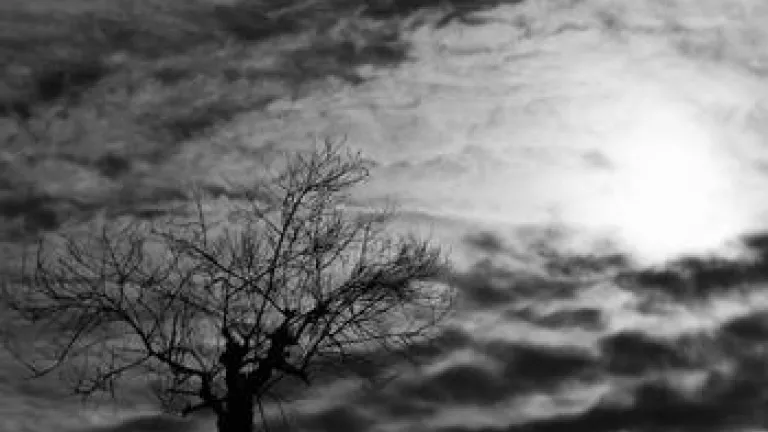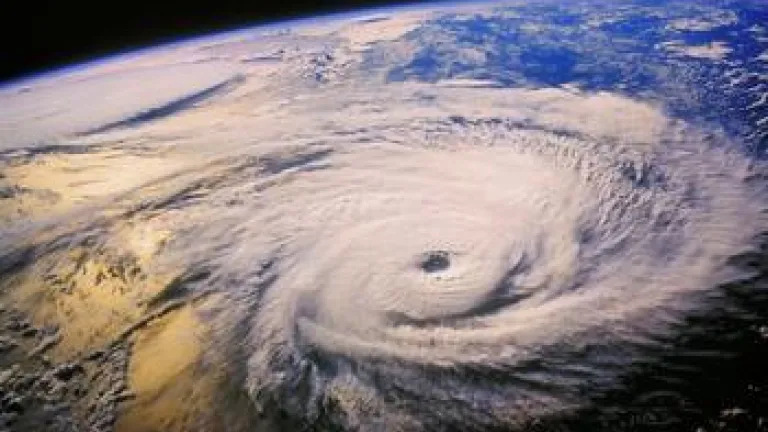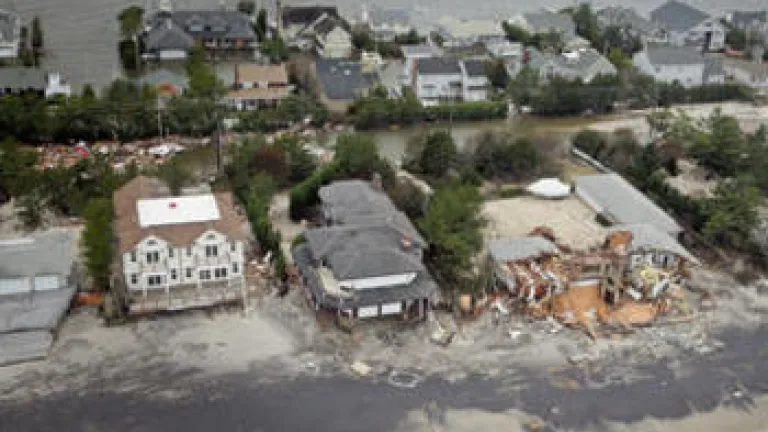Violent Weather: Where Was God?

Over recent months America has been repeatedly stricken by devastating tornadoes, floods, wildfires and drought. Is there a message for us in these events? What is the biblical perspective on such disasters?
In terms of weather in the United States, the spring of 2011 proved to be the deadliest season in more than 60 years, as violent killer tornadoes devastated major areas of the Southeast and Midwest. As of mid-June, the confirmed death toll had passed 520, and was set to climb even higher as more bodies were recovered from the rubble of demolished homes and businesses. Property damage estimates ran into the tens of billions and were still climbing steadily.
While not on the massive scale of what Japan has suffered in its recent earthquake and tsunami, the U.S. weather-related deaths and damage have nevertheless greatly exceeded what American communities and states usually have to cope with.
Meteorologists were astounded by the outbreaks, as wave after wave of violent thunderstorms swept across the United States. From mid-April to late May, the deadly pattern repeated itself. High altitude jet stream winds, moving rapidly, collided with warm, moist, low-altitude winds from the south and southeast, producing a perfect brew of conditions for devastating thunderstorms and tornadoes.
Like a massive army moving along a 500-mile-long front, the weather systems, originating in the southern plains, moved east, spreading death and destruction as they spawned tornadoes, some with winds exceeding 250 miles per hour.
Few things that man builds can withstand the direct onslaught of such winds. Houses were literally blown apart, roofs lifted off as easily as one might take the lid off a jar. Older buildings were reduced to piles of bricks. Metal buildings were ripped apart, their metal panels blown around like scraps of paper. After the devastation passed, survivors emerged to scenes that looked like war zones.
The worst outbreak occurred April 26 and 27, when a wave of more than 100 tornadoes took 350 lives in the Southeast and Midwest—238 in Alabama alone. As April turned into May, most Americans breathed a sigh of relief, believing the tornado season to be over. But late May brought another wave of storms. Early in the morning of May 22 a massive multiple-vortex tornado struck Joplin, Missouri, killing 153 and leaving a six-mile swath of destruction through the heart of the city.
Is violent weather on the increase?
The wave of tornadoes that swept the plains and eastern United States in April and May killed more Americans than any disaster since the terrorist attacks of Sept. 11, 2001. But are killer tornadoes actually increasing in number and intensity? The evidence is inconclusive. Some scientists point to studies showing an increase in the past decade in the deadly category F4 and F5 storms, those with winds approaching 300 miles per hour.
According to the Weather Underground weather service in Ann Arbor, Mich., the 362 confirmed tornadoes that struck April 26-28 set a new record, exceeded only by the wave of twisters that struck the American Midwest and Southeast in early April 1974. "What was truly amazing was the unprecedented number of F5 tornadoes, and how they tended to strike populated areas," said Weather Underground spokesman
Jeff Masters.
Meteorologists have studied the impact of the jet stream, the vast high-altitude river of wind that moves easterly across North America. And they've noted the jet stream's southward shift, which has led to an increase in springtime violent storms and tornado activity.
However, killer tornadoes have been a fixture of American life for the past century. Waves of tornadoes in the 1920s and 1930s actually killed more Americans than this year's outbreak.
Scientists are in agreement, however, that advances in tornado-tracking technology have allowed for earlier and more accurate tornado warnings. For example, Doppler weather radar that can detect the strength of winds inside funnel clouds gives meteorologists the ability to track storms far more accurately than just a few years ago. They also agree that hundreds of lives have been saved as a result of those early warnings.
Where is God when violent weather strikes?
News reports commonly gave accounts of people huddled together in basements, storm shelters or just the inner rooms of houses, praying fervently for God's protection as the killer winds tore their homes to kindling. Americans are, by and large, believers in God, and many of those who survived when others around them died credit their survival to His protection. God may have answered many of those prayers.
But for many, there is the larger question, the same question often voiced in the aftermath of natural disasters: Where was God? How could a God of love allow such disasters to occur? And if He spared some, why did He not spare others?
The Bible does have much to say about God and natural disasters, and it may not be what you expect.
It might come as a surprise to many, but God's Word actually foretells an increase in natural disasters in what the Bible calls "the last days." Let's notice Matthew 24:7, part of Jesus Christ's last major prophecy before His crucifixion. Here He gives His disciples advance notice about what world conditions would be like just prior to His return: "There will be famines, earthquakes, and pestilences in various places."
Luke's account of this same prophecy adds a few more details: "And there will be signs in the sun, in the moon, and in the stars; and on the earth distress of nations, with perplexity, the sea and the waves roaring" (Luke 21:25). Waves roar at sea during violent storms, something that can cause fear in even the most stalwart individuals,
as the next verse indicates.
Both of these passages refer to destructive weather events and other natural disasters to occur in the end time. The past decade has seen a torrent of hurricanes, tornadoes, droughts and floods! The last week of May witnessed record flooding on the lower Mississippi River, while large stretches of Texas, Oklahoma, Louisiana and New Mexico experienced near-record drought. In large areas of the southern plains, 2011 crop yields will be a small fraction of normal. And again, consider what Japan has had to go through.
It isn't just tornadoes, but natural disasters of all types that were foretold to occur with increasing frequency in the end times!
Does God send disasters to punish sinners?
Some, including a number of religious leaders, solemnly declared that the tornadoes of 2011 are God's punishment on those living wretched, sinful lives. But is this accurate?
To begin with, many of those who died were just ordinary, law-abiding, decent people living what society would term normal lives. Many victims attended church regularly, were good neighbors and tried to lead moral, ethical lives. But the storms killed indiscriminately, taking the lives of all types of people.
The Bible does note that it's possible for people to simply be at the wrong place at the wrong time. In ancient times, Israel's King Solomon mused on this exact subject. Notice Ecclesiastes 9:11: "I returned and saw under the sun that—the race is not to the swift, nor the battle to the strong, nor bread to the wise, nor riches to men of understanding, nor favor to men of skill; but time and chance happen to them all" (emphasis added throughout).
We have to realize that life is full of risks, and that natural or unnatural disasters can happen to anyone. Recent history is replete with accounts of people being in the wrong place at the wrong time. Consider those lost when interstate highway bridges collapsed during the Oakland, California, earthquakes in 1991, or the nearly 3,000 tragic deaths when terrorists attacked the World Trade Center on Sept. 11, 2001.
Jesus Christ Himself showed that people can die accidentally, and not because they were singled out for punishment for their sins. We read in Luke 13:3-5 that some were speculating that a number of Galileans murdered by Pilate, or another group killed when a tower fell on them, were sinners and that their death was punishment for their sinful lives.
But notice Jesus' response: "Do you suppose that these Galileans were worse sinners than all other Galileans, because they suffered such things? I tell you, no, but unless you repent you will all likewise perish." Or, as the American Standard Version renders the last part here, "ye shall all in like manner perish." The Darby Translation has: "ye shall all perish in like manner"—that is, in the same way. And what way is that? Completely subject to freak happenstance.
Yet for those who repent of their sins and enter God's family, matters are quite different, as they are then directly within God's care. God promises protection for His children. He is the master potter molding their lives and character. This is not to say they could never die in an accident. They could. But if they do, it is only because God specifically allows it—determining them prepared for eternal life in His family.
The unrepentant in the world at large, on the other hand, can simply be swept away in any random occurrence without God's assurance of help and protection and eternal life.
The wonderful truth is that God will ultimately grant His repentant children immortality with no possibility of perishing. His followers He's allowed to die will at the time of Christ's return be resurrected to life without end.
(It should be mentioned that those who've died without ever repenting will also be raised to life in the age to come, but not yet eternal life. Their lives will still be subject to the possibility of perishing unless they repent and remain faithful at that time. This will not be their second chance for salvation, as some may deem it to be, but their one and only opportunity.)
A coming "time of Jacob's trouble"
While the Bible does not show God using natural disasters to single out individual sinners for punishment, it does prophesy punishment on nations, particularly the major English-speaking countries, for their national sins.
For years, this publication has been proclaiming what many find hard to believe—that a time of national punishment is coming on the United States, Great Britain, Canada, Australia, New Zealand and the other modern descendants of the "Lost Ten Tribes" of ancient Israel (to learn more, request or download our free booklet The United States and Britain in Bible Prophecy).
Many are astounded to learn that the Bible devotes considerable space to this subject. We won't go into detail here, but Jeremiah 30:7 states: "Alas, for that day is great, so that none is like it; and it is the time of Jacob's trouble, but he shall be saved out of it" (after suffering through it).
Amazing as it may sound, the national forebears of today's major English-speaking nations were some of the tribes of Israel, whom God rescued from slavery in ancient Egypt. Many are familiar with how God brought them, after years of wandering in the wilderness, to the borders of the Promised Land. At that historic juncture, He gave them a choice of two ways of life—obedience to His laws, which would bring untold blessings, or rebellion against His way, which would bring curses and national suffering.
In Deuteronomy 28, often referred to as one of the two "blessings and curses" chapters (the other being Leviticus 26), God laid out the choice for His people. Theirs was an agricultural economy, and good weather was crucial to national prosperity. Notice what God said would happen for disobedience: "Your heavens which are over your head shall be bronze, and the earth which is under you shall be iron. The Lord will change the rain of your land to powder and dust" (verses 23-24).
Is it just coincidence that we are seeing yet another severe drought in the United States? A growing chorus of scientists is predicting major changes to weather patterns that may make droughts increasingly common.
The evidence is mounting that something major is happening to our weather. Is God using devastating weather events as part of His punishment on modern Israel? At the very least, these tragic and enormously expensive disasters should make us stand up and take notice!
Living in Satan's world
We also cannot ignore the reality of what the Bible terms "this present evil age." God has, for the present time, turned over much of the control of this world to Satan the devil, the adversary and enemy of mankind. God is allowing Satan considerable sway and latitude over much of what happens on our planet, including the weather.
The apostle Paul was quite aware of this. Writing to the churches in Galatia, he said that Christ "gave Himself for our sins, that He might deliver us from this present evil age, according to the will of our God and Father" (Galatians 1:4).
In another letter to the church at Corinth, he wrote of those "whose minds the god of this age has blinded, who do not believe, lest the light of the gospel of the glory of Christ, who is the image of God, should shine on them" (2 Corinthians 4:4).
Paul freely acknowledged that this is Satan's world and that Satan has a certain amount of control over how this world functions!
Satan has the power to unleash the forces of nature on human beings. The Bible records an actual case of this happening in the book of Job, as recorded in the first chapter. Here we see recorded an actual conversation between God and Satan. God asks Satan, "From where do you come?" and Satan answers, "From going to and fro on the earth, and from walking back and forth on it."
The conversation then proceeds to a discussion of Job, a righteous man who was also blessed with a fine family and much material wealth. Satan challenges God: "Does Job fear God for nothing? . . . You have blessed the work of his hands, and his possessions have increased in the land. But now, stretch out Your hand and touch all that he has, and he will surely curse You to your face!" (Job 1:7-11).
Notice how God responds: "Behold, all that he has is in your power, only do not lay a hand on his person" (verse 12). Satan then proceeds, in the rest of this first chapter, to systematically kill Job's children and destroy his possessions. The final destruction comes as a result of "a great wind [that] came from across the wilderness and struck the four corners of the house, and it fell on the young people, and they are dead" (Job 1:19).
Clearly this shows us that Satan has some control over the weather. This raises an obvious question: Could it be that Satan has reason to send violent weather on mankind?
Revelation 12:12 suggests that there is: "Woe to the inhabitants of the earth and the sea! For the devil has come down to you, having great wrath, because he knows that he has a short time."
Satan is completely aware of the fact that his time of ruling over this earth is fast coming to an end! Yet the final wrath referred to here is the time of the Great Tribulation, which we have not yet entered into (compare verses 13-14).
Times are definitely going to get worse—with worsening calamities. But the ultimate news is very good. A time is coming when good weather will be the norm, when violent storms and killer tornadoes will be a thing of the past. You owe it to yourself to find out how you can be a part of this solution to the problem of violent weather. (Request or download our free booklets The Gospel of the Kingdom and What Is Your Destiny?)
The tornadoes that swept across northern Alabama near where I live killed five members of a family of nine. The local news carried the heart-wrenching story of their funerals, with five caskets lined up outside a funeral home, waiting to be loaded into five black hearses.
Many other equally tragic stories have been repeated in this season of death and destruction from these devastating storms. But God assures us that the day is coming when such scenes will be unknown to mankind, and the reign of "the god of this age" will be no more. God speed that day!







